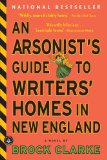Summary | Excerpt | Reviews | Beyond the Book | Readalikes | Genres & Themes | Author Bio

Critics' Opinion:
Readers' Opinion:
First Published:
Sep 2007, 305 pages
Paperback:
Sep 2008, 305 pages
 Book Reviewed by:
Book Reviewed by:
BookBrowse Review Team
Buy This Book
That didn't work out too well, living with my parents. For one, my burning down the Emily Dickinson House caused them some real heartbreak, because my mother was a high school English teacher, my father an editor for the university press in town, and beautiful words really mattered to them; they didn't care anything for movies or TV, but you could always count on a good poem to make them cry or sigh meaningfully. For another, their neighbors in Amherst weren't exactly happy that I'd burned down the town's most famous house and killed two of its citizens in the bargain, so they took it out on my parents. People never had trouble finding our old, creaking house on Chicopee Street: it was always the one with the driveway that had been spray-painted MURDERER! (which I understand) or FASCIST! (which I don't), or with some quote from Dickinson herself that seemed to promise vengeance, but you could never tell exactly what the vengeance might be, because there were a lot of words and the spray-painter always got sloppy and illegible from fatigue or maybe overemotion. It only got worse when I went home after prison. There was some picketing by the local arts council and some unwelcome, unflattering news coverage, and neighborhood kids who cared nothing about Emily Dickinson or her house started egging the place and draping our noble birches with toilet paper, and for a while there it was like Halloween every day. Then things really got serious and someone slashed every tire on my parents' Volvo, and once, in a fit of anger or grief, someone hurled a Birkenstock through one of our bay windows. It was a man's right shoe, size twelve.
All of this happened within the first month of my return home. At the end of the month, my parents suggested I move out. I remember it was August, because the three of us were sitting on our front porch and the neighbors' flags were out, caught between the Fourth of July and Labor Day and in full flutter, and the light was spectral through the maple and birch leaves and it was all very pretty. You can imagine how much my parents' request that I leave home wounded me, even though the College of Me said that life after prison wouldn't be easy and that I shouldn't fool myself into thinking otherwise.
"But where should I go?" I asked them.
"You could go anywhere," my mother said. Back then I thought she was the harder parent of the two and had had high hopes for me, so the disappointment weighed on her more heavily. I remember that my mother was a dry well at my trial when the jury brought back the verdict, although my father had wept loudly and wetly, and he was starting to cry now, too. I hated to see them like this: one cold, the other weepy. There was a time when I was six and they taught me to skate on a pond at the Amherst public golf course. The ice was so thick and clean and glimmery that the fish and errant golf balls were happy to be frozen in it. The sun was streaking the falling snow, making it less cold. When I finally made it around the perimeter of the pond without falling, my mother and father gave me a long ovation; they were a united front of tickled, proud parenthood. Those times were gone: gone, gone, forever gone.
"Maybe you could go to college, Sam," my father said after he'd gotten ahold of himself.
"That's a good idea," my mother said. "We'd be happy to pay for it."
"OK," I said, because I was looking at them closely, really scrutinizing them for the first time since I'd been home from prison, and I could see what I'd done to them. Before I burned down the Emily Dickinson House, they seemed to be normal, healthy, somewhat happy Americans who took vacations and gardened and who'd weathered a rough patch or two (when I was a boy, my father left us for three years, and after he left us, my mother started telling me tall tales about the Emily Dickinson House, and all of this is part of the larger story I will get to and couldn't avoid even if I wanted). Now they looked like skeletons dressed in corduroy and loafers. Their eyes were sunken and wanting to permanently retreat all the way back into their skulls. A few minutes earlier, I'd been telling them about my virginity and the lecherous Arthur Andersen accountant. My parents, as far as I knew back then, were both modest Yankees who didn't like to hear about anyone's private business, but the College of Me insisted that it was healthy and necessary to tell the people we love everything. Now I was regretting it. Why do we hurt our parents the way we do? There's no way to make sense of it except as practice for then hurting our children the way we do.
Excerpted from An Arsonist's Guide to Writers' Homes in New England by Brock Clarke © 2007 by Brock Clarke. Excerpted by permission of Algonquin Books. All rights reserved. No part of this excerpt may be reproduced or reprinted without permission in writing from the publisher.





The Funeral Cryer by Wenyan Lu
Debut novelist Wenyan Lu brings us this witty yet profound story about one woman's midlife reawakening in contemporary rural China.
Your guide toexceptional books
BookBrowse seeks out and recommends the best in contemporary fiction and nonfiction—books that not only engage and entertain but also deepen our understanding of ourselves and the world around us.